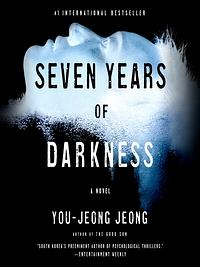Take a photo of a barcode or cover
dark
mysterious
sad
tense
medium-paced
Strong character development:
Yes
Loveable characters:
Complicated
Diverse cast of characters:
No
Flaws of characters a main focus:
Complicated
dark
mysterious
reflective
sad
tense
slow-paced
Strong character development:
Complicated
Loveable characters:
No
Diverse cast of characters:
No
Flaws of characters a main focus:
Yes
I can’t really think of another book I’ve read set in modern day South Korea. I loved this book, the writing is beautiful & the story compelling. My only complaint - a particularly American one probably - is that a couple of the names in the book were SO similar that I had a hard time figuring out who it was.
A totally excellent, multi-faceted, layered, and surprising thriller spanning generations.
Seven Years of Darkness is the translation by Chi-Young Kim (perhaps best known for Please Look After Mother) of the 2011 novel 7 년의 밤 by 정유정 (Jeong You-Jeong).
I have previously read The Good Son / 종의 기원 (the Korean title actually translates as The Origin of the Species) by the same translator/author (my review https://www.goodreads.com/review/show/2391289859)
The Korean original opens with the striking line from Choi Sowon, “나는 내 아버지의 사형 집행인이었다” – “I was my father’s executioner” – which is oddly missing from the English edition.
It continues (consistently with the English).
2004년 9월 12일 새벽은 내가 아버지 편에 서 있었던 마지막 시간이었다. 그땐 아무 것도 몰랐다.
In English:
The early morning of September 12, 2004, was the last time I was firmly on my father’s side. I didn’t know anything at the time.
On that day in 2004, seven years earlier, Sowon was 11. His father Choi Hyonsu, a former minor-league baseball player, was the newly appointed (less than two weeks earlier) head of security at Seryong Dam.
Hyonsu allegedly opened the floodgates of the dam, drowning many villagers after he had murdered his own wife and Oh Yongje, the father of a 11 year-old girl who had been discovered, murdered, in the lake reservoir by the dam two weeks earlier. Hyonsu is later also charged with, and convicted of, the girl’s murder and as the novel opens is awaiting execution.
For the next ‘seven years of darkness’, Sowon is passed from one relative to another, never lasting at any place more than a few months, as someone, unknown, always sends his new family and school copies of magazine articles about Sowon’s father’s crimes, including an infamous picture of Sowon himself taken on that day in 2004, oddly unemotional when he was told what had happened. The unemotional façade is one he maintains during the seven years.
I knew it was normal to be flustered when you were surprised, to be angry when you were humiliated—Mr. Ahn kept telling me it was okay to live like that. I disagreed: I had to live, period. And to live, I couldn’t panic or get angry or feel vulnerable. I had to withdraw further into the cold, remote core inside myself, and wait there, where I was safe. This tenacity was what kept me going—what kept me from killing myself.
Mr Ahn Sunghwan was one of the security guards working for Sowon’s father and lived in company accommodation with the family, and he eventually takes in Sowon when his birth family finally abandon him, the two of them roaming around the coasts of Korea, diving in their spare time.
Then one day Sunghwan disappears and leaves behind, for Sowon, a novelised account of what actually happened, one written from the perspective of an omniscient narrator able to impute the thoughts of those involved in the events.
Why did Mr. Ahn write this? I wondered. Did he want to publish it? Or was it for me, so I would know the truth? I had no way of knowing what was factual and what he’d guessed or imagined. I supposed he could have pieced together my parents’ sections through interviews. But Oh Yongje . . . who could have spoken to his inner thoughts?
Much of what we read is contained in this novel-within-a-novel, although Jeong doesn’t seem to do as much with this device as I had hoped – e.g. there doesn’t seem to be any suggestion the narrator is unreliable or even subjective.
As with The Good Son, the story isn’t so much interested in whodunnit (there are some revelations but no last minute twists) as whydidtheydoit, i.e. the psychological motivations of the characters, although the resulting story is rather implausible and the focus on several different characters makes this less intense and satisfying as The Good Son.
Jeong also attempts to crank up the tension with two action sequences – one set in the events of the past (even though we essentially know what happened) and one in the present day as the story turns on a cycle of revenge. This part of the novel felt more suitable for a movie than a novel, and indeed the book was made into a film.
Overall, I’m not really the right audience for this. I read it due to my interest in translated Korean literature, and not because of the publisher’s description of Jeong as “Korea’s Stephen King” as I wouldn’t read a novel by America’s version.
So my rating should be taken in this context – but I didn’t find the novel as successful even on its own terms as The Good Son.
I have previously read The Good Son / 종의 기원 (the Korean title actually translates as The Origin of the Species) by the same translator/author (my review https://www.goodreads.com/review/show/2391289859)
The Korean original opens with the striking line from Choi Sowon, “나는 내 아버지의 사형 집행인이었다” – “I was my father’s executioner” – which is oddly missing from the English edition.
It continues (consistently with the English).
2004년 9월 12일 새벽은 내가 아버지 편에 서 있었던 마지막 시간이었다. 그땐 아무 것도 몰랐다.
In English:
The early morning of September 12, 2004, was the last time I was firmly on my father’s side. I didn’t know anything at the time.
On that day in 2004, seven years earlier, Sowon was 11. His father Choi Hyonsu, a former minor-league baseball player, was the newly appointed (less than two weeks earlier) head of security at Seryong Dam.
Hyonsu allegedly opened the floodgates of the dam, drowning many villagers after he had murdered his own wife and Oh Yongje, the father of a 11 year-old girl who had been discovered, murdered, in the lake reservoir by the dam two weeks earlier. Hyonsu is later also charged with, and convicted of, the girl’s murder and as the novel opens is awaiting execution.
For the next ‘seven years of darkness’, Sowon is passed from one relative to another, never lasting at any place more than a few months, as someone, unknown, always sends his new family and school copies of magazine articles about Sowon’s father’s crimes, including an infamous picture of Sowon himself taken on that day in 2004, oddly unemotional when he was told what had happened. The unemotional façade is one he maintains during the seven years.
I knew it was normal to be flustered when you were surprised, to be angry when you were humiliated—Mr. Ahn kept telling me it was okay to live like that. I disagreed: I had to live, period. And to live, I couldn’t panic or get angry or feel vulnerable. I had to withdraw further into the cold, remote core inside myself, and wait there, where I was safe. This tenacity was what kept me going—what kept me from killing myself.
Mr Ahn Sunghwan was one of the security guards working for Sowon’s father and lived in company accommodation with the family, and he eventually takes in Sowon when his birth family finally abandon him, the two of them roaming around the coasts of Korea, diving in their spare time.
Then one day Sunghwan disappears and leaves behind, for Sowon, a novelised account of what actually happened, one written from the perspective of an omniscient narrator able to impute the thoughts of those involved in the events.
Why did Mr. Ahn write this? I wondered. Did he want to publish it? Or was it for me, so I would know the truth? I had no way of knowing what was factual and what he’d guessed or imagined. I supposed he could have pieced together my parents’ sections through interviews. But Oh Yongje . . . who could have spoken to his inner thoughts?
Much of what we read is contained in this novel-within-a-novel, although Jeong doesn’t seem to do as much with this device as I had hoped – e.g. there doesn’t seem to be any suggestion the narrator is unreliable or even subjective.
As with The Good Son, the story isn’t so much interested in whodunnit (there are some revelations but no last minute twists) as whydidtheydoit, i.e. the psychological motivations of the characters, although the resulting story is rather implausible and the focus on several different characters makes this less intense and satisfying as The Good Son.
Jeong also attempts to crank up the tension with two action sequences – one set in the events of the past (even though we essentially know what happened) and one in the present day as the story turns on a cycle of revenge. This part of the novel felt more suitable for a movie than a novel, and indeed the book was made into a film.
Overall, I’m not really the right audience for this. I read it due to my interest in translated Korean literature, and not because of the publisher’s description of Jeong as “Korea’s Stephen King” as I wouldn’t read a novel by America’s version.
So my rating should be taken in this context – but I didn’t find the novel as successful even on its own terms as The Good Son.



